
On October 24 2015, Senegalese NGO CONAF – the National Committee for Literacy and Training – convened civil society representatives, public health practitioners, village chiefs, civil registry officials, and religious leaders at the launch ceremony for its program to improve women and children’s access to civil registry in the region of Diourbel. In an effort to eradicate unregistered births in the region, The Mayor of Ngogom publicly committed to improving access to civil registry so that all newborns in Ngogom will be immediately registered by 2017. The launch ceremony was also attended by the Director of the National Center for Civil Registry (CNEC) within Senegal’s Ministry of Local Governance, Ms. Dieh Mandiaye Bâ, who announced a presidential initiative to provide free registration to all undocumented elementary school students across the country. Informational booklets and materials for registering births, deaths, and marriages were distributed at the launch ceremony in French, Arabic, and national languages.
CONAF recognizes that difficulty obtaining vital documents such as birth and marriage certificates is a significant obstacle to accessing public services and claiming basic rights – especially for women and children in rural communities – and will carry out a series of capacity building and educational activities over the course of the next year to improve access to civil registry. CONAF is one of four organizations to receive seed funding through WJP’s World Justice Challenge in Senegal in 2015.
Ministre et maire local affirment leur engagement à éradiquer des naissances irrégulières au Sénégal
Le 24 octobre 2015, l’ONG Sénégalaise, le CONAF – le Comité National pour l’Alphabétisation et la Formation – a réuni des représentants de la société civile, des prestataires de santé, des chefs de villages, des responsables de l’état civil et des chefs religieux à la cérémonie de lancement pour son projet pour améliorer l’accès des femmes et des enfants à l’état civil dans la région de Diourbel. Dans un effort d’éradiquer les naissances irrégulières dans la région, le Maire de Ngogom a publiquement pris l'engagement d’améliorer l’accès à l’état civil pour que tous les enfants soient déclarés dès la naissance à l’horizon 2017. Mme. Dieh Mandiaye BA, Directrice du Centre National de l'Etat Civil (CNEC), est venue représenter M. le Ministre de la Gouvernance Locale et a annoncé l’initiative du Chef d’Etat de rendre gratuite la régularisation des naissances pour tous les élèves du cycle élémentaire. Les livrets informatifs et des imprimés d’extrait de naissance, de décès et de mariage ont été distribués en français, en arabe, et en langue nationale.
Le CONAF reconnaît que la difficulté d’obtenir les documents d’état civil – tels que les actes de naissance et de mariage – est un important obstacle pour accéder aux services publics et pour réclamer les droits fondamentaux, particulièrement pour les femmes et les enfants dans les communautés rurales. Au cours de l’année à venir, il mettra en œuvre une série d’activités destinées à éduquer et renforcer la capacité des communautés à accéder à l’état civil. Le CONAF est l’un des quatre organisations à recevoir des fonds de démarrage grâce au « World Justice Challenge » au Sénégal en 2015.
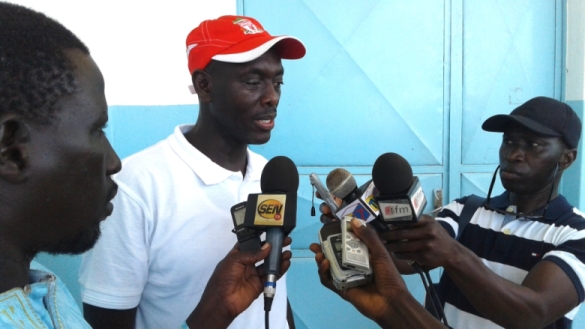
Coordinator of CONAF, Mr. Djibril Ndong, being interviewed by the press/Coordinateur du CONAF, M. Djibril NDONG, interviewé par la presse
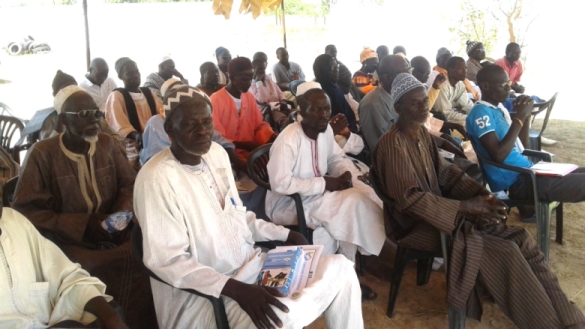
Village chiefs/Chefs de villages
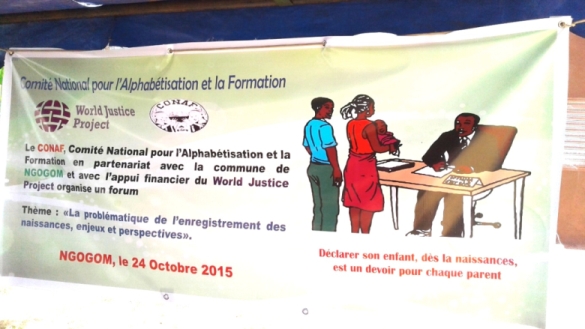
“CONAF, the National Committee for Literacy and Training, in partnership with the town of Ngogom and with the financial support of the World Justice Project, is organizing a forum on ‘Registering Births: Concerns and Perspectives.’ Registering your child at birth is every parent’s duty.”
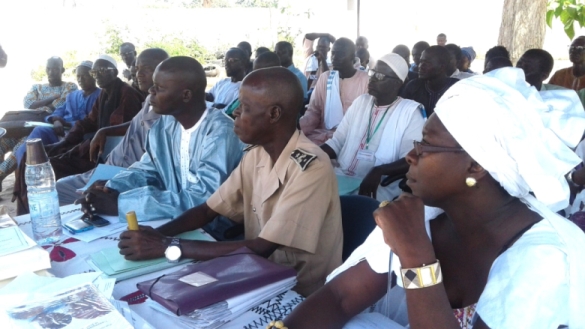
The Mayor of Ngogom, the Sub-Prefect representing the Inspector for Education and Training of Bambey, and the Director of CNEC/Le Maire de Ngogom, le Sous-Préfet représentant de l'Inspecteur de l'Education et de la Formation de Bambey,et la Directrice du CNEC
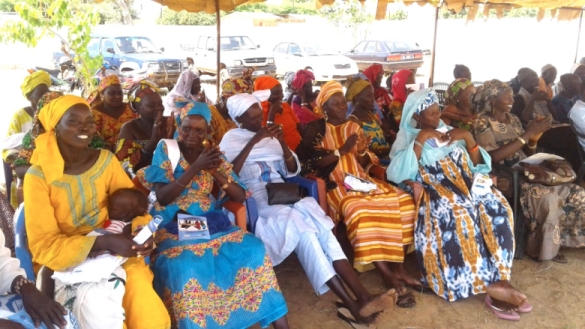
Local women in attendance/Les femmes locales qui ont participé






